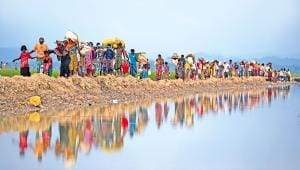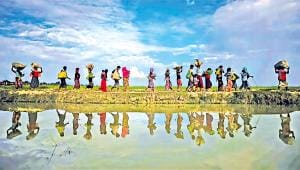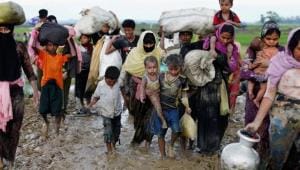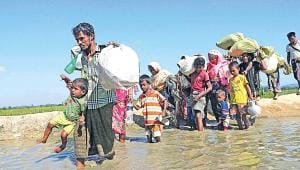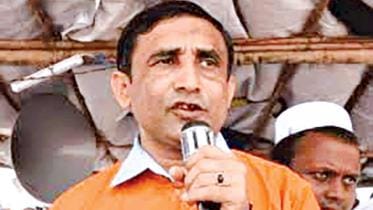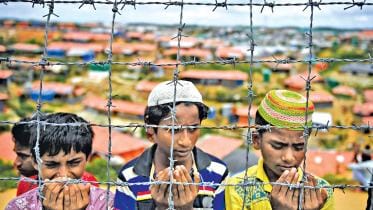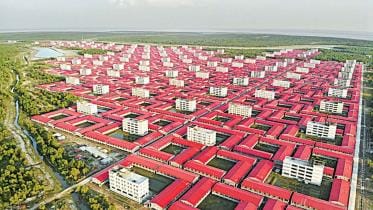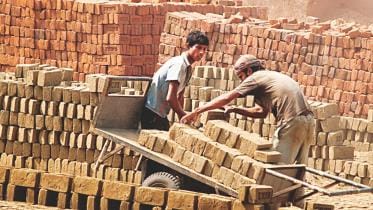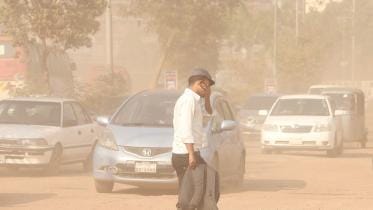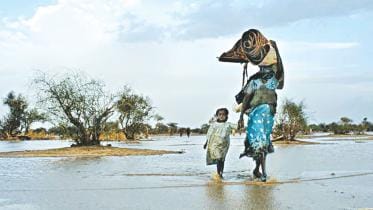Transitional solutions for refugee protection through the lens of the Rohingya crisis
Around the world, many people are forced to leave their houses, country of origin and cross borders to find dignity and safety from conflict, persecution and gross violation of human rights.
4 November 2025, 18:00 PM
Legal reform is key to protecting intellectual property rights of Indigenous culture
The key foundation for any transmitting legal system is to recognise the Indigenous customary law.
1 November 2025, 07:00 AM
Addressing climate-induced displacement in Bangladesh
Climate change is acknowledged as a critical factor in human migration around the world. It causes a significant amount of displacement in countries like Bangladesh.
14 October 2025, 18:00 PM
Access to criminal justice and the Rohingya refugees
More than a million Rohingyas are living in the refugee camps in Southern Bangladesh who are not only deprived of citizenship but also access to justice.
2 September 2025, 18:00 PM
The urgent need for legal reform for Rohingya refugees
More than a million Rohingya people who took shelter here are yet to be accorded formal refugee status, although Bangladesh has been widely commended for being their host since 2017.
6 August 2025, 10:00 AM
Burden sharing in the context of refugee crisis
The UN Refugee Convention 1951 was crafted to support the refugees legally and morally. Many European states benefitted from the convention after World War II. However, it is a matter of irony that many of these same states are in favour of close borders now, whenever people are seeking refuge as the victims of war, ethnic cleansing, political or communal clashes, etc.
9 May 2024, 18:00 PM
The hurdles to academic freedom in Bangladesh
In the current Bangladeshi scenario, even core academic and intramural speeches are not well protected by the constitutional regime.
7 April 2024, 04:00 AM
Questioning the ‘token repatriation’ of the Rohingyas
Last month, a delegation from Myanmar visited the Rohingya camps in Bangladesh to advance the talks in relation to the repatriation of the Rohingyas on a pilot basis. The Myanmar representatives planned to verify documents and repatriate around
27 April 2023, 18:00 PM
Effectiveness of ‘local settlement’ practice for protection of Rohingyas
Since 2020, the Government of Bangladesh has been relocating the Rohingyas to Bhashan Char. The UN and other agencies initially criticised the relocation process.
22 April 2022, 18:00 PM
Military Junta representing Myanmar at the ICJ
The International Court of Justice (ICJ) has recommenced The Gambia v Myanmar case hearing. It has approved the military junta government to represent the case on behalf of Myanmar.
4 March 2022, 18:00 PM
The dynamics of Rohingya repatriation today
The safe repatriation of the Rohingya peoples has been much talked for a while; but during the pandemic, the relevant stakeholders have lightly taken the efforts to initiate the said repatriation.
15 October 2021, 18:00 PM
One Mushtaq, a Digital Security Act and the freedom of speech
Constitutionally it seems Bangladesh accolades unlimited freedom of thought and conscience and it muzzles any sort of pre-censorship on freedom of speech and expression with some reasonable restrictions considering the security of state, communal and religious harmony, decency or morality and public order etc.
15 March 2021, 18:00 PM
Denial of Rohingya identity and their right to internal self-determination
Rohingya’s plight surrounding non-recognition is as old as the history of colonialism in South Asia and South East Asia.
15 February 2021, 18:00 PM
The dynamics of Rohingya relocation under ‘internal relocation alternative’
Internal relocation alternative is one of the doctrines recently developed to determine refugee or asylum seeker status in a host country. It basically examines whether the asylum seeker has exhausted all his opportunities of relocation in his country of origin during status seeking.
28 December 2020, 18:00 PM
For effective management of medical waste
Medical wastes have been the reason of thousands of deaths around the world.
2 March 2020, 18:00 PM
Copyright protection for healthy meme culture
The term ‘meme’ is self-explanatory. They are mostly seen as photos, Gifs (Graphics Interchange Format), illustrations, videos or movie excerpts with humorous texts. Memes can also be termed as virally transmitted cultural symbols and social ideas. Whether
16 September 2019, 18:00 PM
The importance of forensic evidence in our justice system
With the advent of time, the commission of crimes is becoming more sophisticated, critical, digital and organised. The pattern of committing crimes is changing with the changes of science and technology.
10 June 2019, 18:00 PM
Protecting the workers of informal sector
International Labor Organization has demonstrated in its recent report that there are 2 billion workers across the world working in the
29 April 2019, 18:00 PM
The Clean Air Act should be passed without further delay
Dhaka has been ranked as the second most polluted capital city in the world in the 2018 World Air Quality Report released by
19 April 2019, 18:00 PM
Protecting 'Climate Induced Migrants' of Bangladesh
The annual report 2017 of Internal Displacement Monitoring Center-Bangladesh shows that, Bangladesh is impregnated with 946000 internally displaced people.
26 November 2018, 18:00 PM




